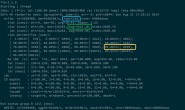C++使用key文件进行xor加解密
/*
The function (en/de)crypts an input data file with an input key
file using the XOR method.
The use of a key file instead of a plain text key makes it much
more flexible and secure. If the key is longer than the encrypted data,
truly random (btw, compressed files like mp3 or jpg provide pretty
good "almost-like-random" characters) and used only once, even though
the metod is so simple, it is unbreakable even in theory.
*/
//libraries to include
#include <stdio.h> //for file handling and other IO
#include <stdlib.h> //for the exit function
//macros
#define BUF 512 //input filename buffer size
#define CNK 256 //IO buffer size
#define FILCHK(x) if(!x){printf("Cannot open file %s\n", x); exit(EXIT_FAILURE);} //file pointer checker
//xor (en/de)coding function
void xorenc(char *inname, char *outname, char *keyname)
{
FILE *infile, *outfile, *keyfile; //file pointers
char datachunk[CNK], keychunk[CNK]; //input data & key buffers
long datapos, keypos, datalen, keylen, keymax; //data lengths
//open files
infile = fopen(inname, "rb"); //binary mode (b) is crucial
FILCHK(infile); //check the file pointer
outfile = fopen(outname, "wb");
FILCHK(outfile);
keyfile = fopen(keyname, "rb");
FILCHK(keyfile);
//get key length
fseek(keyfile, 0L, SEEK_END); //seek the end of file
keymax = ftell(keyfile); //tell what its position is
rewind(keyfile); //go back to the beginning of the key file
//get the first key chunk
keypos = 0; //initialize the key buffer position
keylen = fread(keychunk, 1, CNK, keyfile); //binary read a chunk of the key
//an infinite loop
while(1)
{
//binary read a chunk of data
datalen = fread(datachunk, 1, CNK, infile);
//for every char in the input buffer
for(datapos = 0; datapos < datalen; ++datapos)
{
datachunk[datapos] ^= keychunk[keypos++]; //xor a data char with a key char
//if the whole key chunk was used
if(keypos == CNK)
{
keylen += fread(keychunk, 1, CNK, keyfile); //read a new key chunk
keypos = 0; //set the key buffer position to 0
}
//otherwise, if the whole key file was used
else if(keypos == keymax || keypos == keylen)
{
rewind(keyfile); //rewind it
keylen = fread(keychunk, 1, CNK, keyfile); //read a key chunk
keypos = 0; //set the key buffer position to 0
}
}
//binary write the (en/de)crypted data
fwrite(datachunk, 1, datalen, outfile);
//if the whole data file was processed
if(datalen < CNK)
break; //end the loop
//otherwise, if the whole key file was processed
else if(keylen == keymax)
{
rewind(keyfile); //rewind it
keylen = fread(keychunk, 1, CNK, keyfile); //read a key chunk
keypos = 0; //set the key buffer position to 0
}
}
//close the files
fclose(infile);
fclose(outfile);
fclose(keyfile);
}




